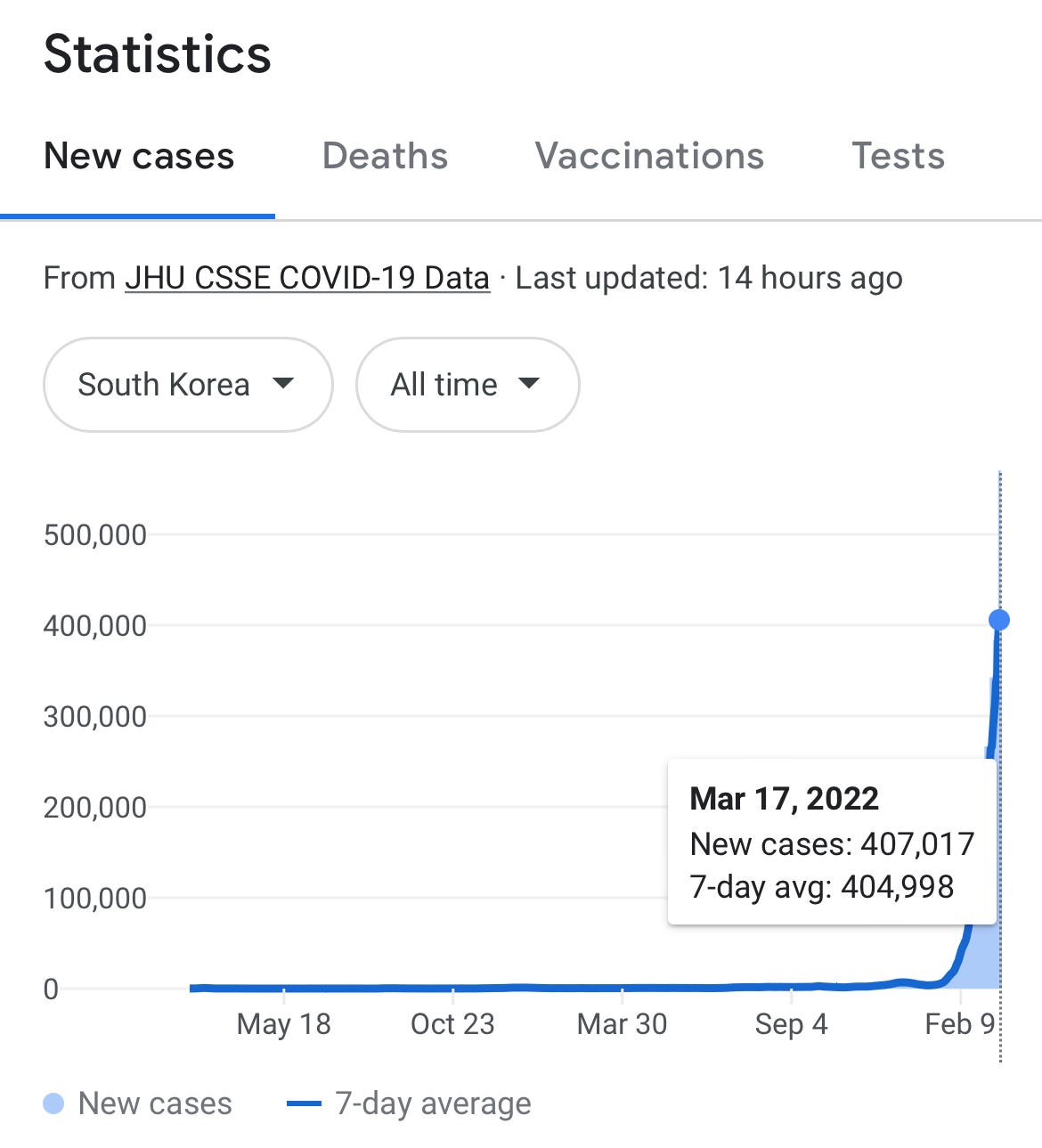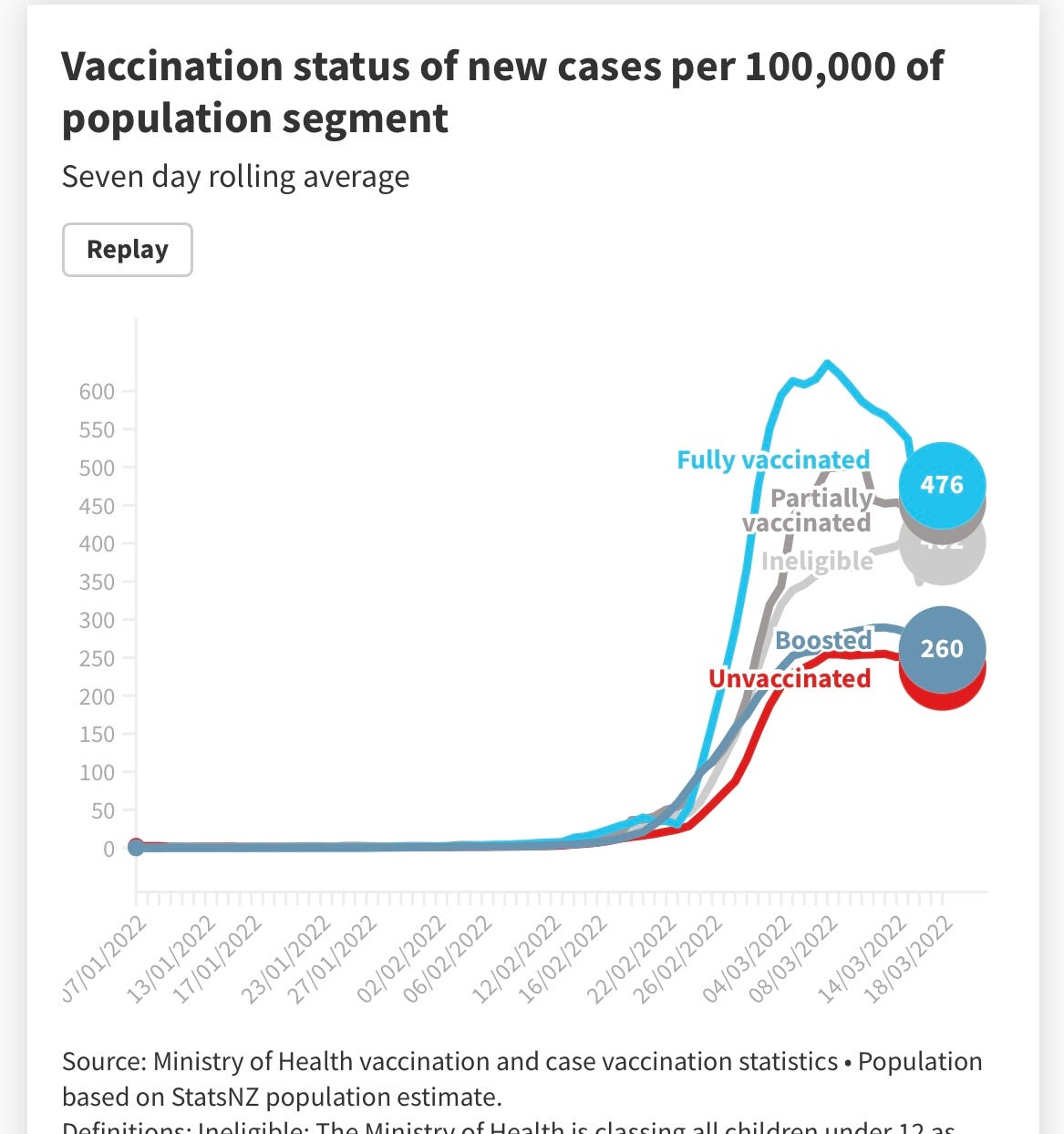Through 2020 and 2021, South Korea chased zero Covid with strict border controls, aggressive testing and tracing, and a vaccination campaign that reached nearly its entire adult population with mRNA (and some DNA) shots.
The country didn’t quite get to zero. Infections and deaths rose slowly last year. But it came close enough that the usual highly credentialed public health experts held it up as a light among the nations.
Here’s Devi Sridhar - once the world’s youngest Rhodes Scholar, today a “personal chair” in Global Public Health at the University of Edinburgh Medical School - telling the world in November 2021 how super-duper-good South Korea did:
Devi - you can trust her, look at that piercing gaze! - explained:
Maximum suppression helped buy time for scientists to get to work, and therefore find a sustainable exit from the crisis… The pivot from maximum suppression to mass vaccination was a rational and logical shift to achieve a successful transition out of the pandemic.
Devi?
Reality called. It has some edits to your piece.
On Thursday, South Korea reported 600,000 new Covid infections - the equivalent of more than 4 million in the United States. In a single day.
Covid deaths are skyrocketing too. South Korea reported 429 deaths Thursday, the equivalent of about 3,000 in the United States. That number is all but certain to skyrocket - cases have risen so fast that deaths have not had time to catch up yet. No one should be surprised if South Korea reports more than 1,000 daily Covid deaths in the next month.
Dial E for exponential:
South Korea, even more than Hong Kong, shows the world what happens when Omicron hits a densely populated region that has no prior Covid immunity at the wrong time, as the mRNA shots fail in unison.
The mRNA shots have negative efficacy against Omicron infection within months - meaning that vaccinated people are more likely to become infected. Data from Canada, Britain, Scotland, the United States, and other countries all agree on this point. I’m not sure anyone serious even argues it anymore.
In New Zealand, for example, unvaccinated people now have even lower infection rates than those who have received boosters:
—
So South Korea finds itself exactly the wrong place in the Covid cycle.
It vaccinated its citizens mostly from June through October 2021. It started boosters in November, and the people who who received the third jabs first were the elderly and frail. The reason South Korea has the highest rate of new Covid cases any country has ever seen is not despite but because it is so highly vaccinated. The failure of the shots is accelerating the rate of infection and transmission.
Hospitalizations and deaths are rising too, though they have not reached the overwhelming levels that the case figures would suggest. The vaccine advocates - clinging to the last plank of the rapidly sinking SS MRNA - insist this is proof the vaccines are working. Or at least not failing catastrophically.
Maybe. Maybe not. Several factors complicate the picture around hospitalizations and deaths. Omicron is more contagious but milder. Treatments have improved in the last two years, and doctors now do everything possible to keep people off ventilators (in Britain, for example, the number of ventilated patients in Britain has almost completely decoupled from hospitalizations).
Also, South Korea has some of the thinnest people in the world (it is so focused on keeping its citizens thin that it uses a BMI standard of 25 for obesity, rather than the international standard of 30, to make its numbers look worse and encourage citizens to view obesity as a crisis). Obesity is a critical risk factor for Covid, so South Korea’s relative thinness makes cross-national comparisons even more difficult to make.
Finally, at this point no one can know how many hospitalizations and deaths South Korea will have in the next couple of months. By the time the counting is done, though, the world’s attention will elsewhere and the advocates will be onto Shot Five (this time it’ll work, really!).
—
Meantime, as cases and hospitalizations and deaths take off, South Korea is doing -
Well, pretty much nothing. The country has been loosening restrictions for months and says it will continue to do so.
As the Times wrote Thursday:
With the vast majority of its adult population vaccinated and about nine out of 10 of those 60 and older with a booster, South Korea is pushing ahead with plans to ease social distancing measures, relax border restrictions and learn to live with the virus’s risk, even as it is experiencing some of the highest per-person infection rates anywhere in the world.
The reality is that the South Koreans can’t do anything else. They’re not going back into lockdown, and they’ve already given boosters to basically everyone who might get any short-term benefit from them.
Devi Sridhar laid out what was supposed to happen (and what she thought had happened): lockdowns would be the bridge to vaccines which would be the tunnel to freedom! Good countries like South Korea would win and mean nasty selfish countries like the United States would lose.
Mistakes have clearly been made in both the UK and US – in particular, a cynical fatalism that no scientific solution would emerge, that mass infection was inevitable…
But biology is not a morality play. Science doesn’t always win, even if Pfizer pinky swore that it would:
—
We’re all Team Reality now, folks, even if some of the bluechecks still haven’t caught up. The only question left is not how much good but how much damage those miracle shots have done.
https://alexberenson.substack.




